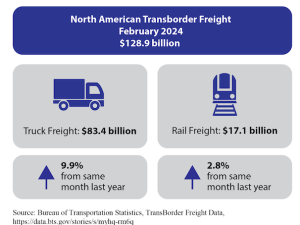Forget Fat Profits as Commodities Grind Spells Railway Slog
By: | Apr 12 2016 at 04:41 PM | Intermodal
With any path to railroad mergers blocked for now, the largest U.S. carriers will have to rely on cost cuts and better service to boost profit. Judging by the first-quarter earnings forecasts, it will be a long slog.
Canadian Pacific Railway Ltd.’s decision to abandon its bid for Norfolk Southern Corp.—after a groundswell of opposition from shipping customers and the U.S. Justice Department—signals that additional attempts at consolidation are unlikely, according to analysts including Benjamin Hartford of Robert W. Baird & Co. That leaves the onus on carriers to wring out savings or risk antagonizing customers with price increases.
Large U.S. railroads are expected to report tumbling first-quarter profits as lower coal, oil and steel shipments signal a tough year for the industry. CSX Corp., another U.S. railroad that Canadian Pacific tried and failed to take over, kicked off what promises to be a weak earnings season when it posted a drop in profit after the close of regular trading Tuesday.
“This year is a grind,” said Logan Purk, an analyst at Edward Jones & Co. “The market wants to see how you right-size your business and if you can show minimal earnings drop or flat earnings on a decline in volumes.”
Amid the commodities downturn, Canadian Pacific Chief Executive Officer Hunter Harrison made three offers starting in November to merge with Norfolk Southern after CSX rejected his overtures in 2014. Canadian Pacific on Monday dropped its efforts for a Norfolk Southern deal, with Harrison saying he saw “a deck stacked against us” as opposition mounted. He had tried in vain to restart talks with CSX in January.
Coal Decline
U.S. rail shipments fell 6.5 percent in the first quarter from a year earlier, led by a decline in coal, according to the Association of American Railroads. Unusually warm winter weather, tougher environmental regulations and inexpensive natural gas that gave utilities incentive to switch fuels caused coal carloads to plummet 33 percent.
The coal decline is especially painful because it is one of CSX’s most profitable cargoes. The fossil fuel accounted for 19 percent of the railroad’s revenue last year, down from 31 percent in 2010. Shipments of steel also dropped sharply in the quarter, dragged down by sluggish economic growth, while slumping oil prices hurt crude shipments.
“We’re in a commodities recession—full stop,” said Lee Klaskow, an analyst at Bloomberg Intelligence. “The longer-term trend is for coal demand to be down.’’
Merger Failure
CSX’s earnings declined to 37 cents a share from 45 cents a year earlier, meeting the average of 25 analysts’ estimates compiled by Bloomberg. Sales dropped 14 percent to $2.62 billion, the company reported Tuesday.
“While CSX delivered strong efficiency gains in the first quarter, we continue to expect full-year earnings per share to decline in 2016 as a result of ongoing coal headwinds combined with other market fundamentals,” CEO Mike Ward said in a statement.
First-quarter profit at Union Pacific Corp., the largest publicly traded railroad in North America, is projected to drop to $1.10 a share from $1.30. The carrier reports earnings on April 21.
A major railroad merger hasn’t been attempted since regulators blocked a combination of BNSF Railway and Canadian National Railway Co. in 2000 and the following year adopted tougher criteria for approving deals. Canadian Pacific’s failure to win over Norfolk Southern and major shippers points to a climate where deals aren’t welcome, said Hartford, of Robert W. Baird.
“At the moment, it doesn’t appear the appetite among the remaining rails for consolidation is very high,” he said. “Certainly, shippers are opposed to it.”
Consolidation Blow
To persuade customers to support a railroad combination, the industry would have to suffer from permanent congestion, a long-term lack of capacity or a carrier that was failing operationally or financially, said Tony Hatch, founder of ABH Consulting, which specializes in railroads. That’s not close to happening now, even with the sharp drop in coal cargo.
“I don’t think this is a death knell, because conditions change,” Hatch said of Canadian Pacific’s failed effort. “But this is certainly a blow to those who think consolidation is going to happen.”








